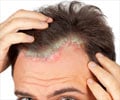People with psoriasis are less likely to react to looks of disgust by others than people without the condition, according to a new study
People with psoriasis are less likely to react to looks of disgust by others than people without the condition, according to a new study by University of Manchester scientists.
The researchers used magnetic resonance imaging (MRI) scans to compare the brains of 26 men, half of whom had chronic psoriasis.The researchers looked at the insular cortex - a part of the brain triggered by both feelings and observations of disgust - to see how participants responded to images of disgusted faces.
They found that the volunteers with psoriasis had a much weaker response in their insular cortex than the healthy volunteers, suggesting they have developed a coping mechanism to protect themselves from adverse emotional responses to their condition by others.
"Psoriasis has a significant negative impact on the physical and psychological well-being of those affected but little is known about the neurocognitive mechanisms of how patients cope with the adverse social stigma associated with visible skin lesions," said Dr Elise Kleyn, the dermatologist who carried out the research.
"We had previously shown that psoriasis patients commonly believe that they will be evaluated solely on the basis of their skin and so often avoid social situations they think will be stressful or humiliating as a coping mechanism.
"For this study we wanted to investigate whether the social impact of psoriasis is associated with altered cognitive processing in response to facial expressions of disgust by measuring brain activity in the insular cortex.
Advertisement
The research team was headed by world-renowned dermatologist Professor Chris Griffiths.
Advertisement
Source-ANI
RAS















